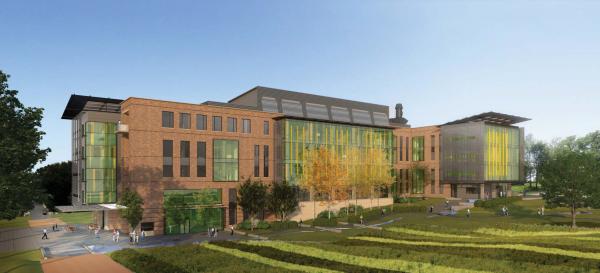John McDonald, professor in the School of Biology and director of the Integrated Cancer Research Center, has also spent many years as the chief scientific officer for Georgia Tech’s Ovarian Cancer Institute.
Collaboration doesn’t just come easy for him. It is at the very foundation of his research approach when it comes to understanding cancer. McDonald, then, was a natural choice among faculty members who will relocate to the Engineered Biosystems Building (EBB) when it opens in 2015. Campaign Georgia Tech has been instrumental in raising money for the building.
“I’m convinced that the effective treatment of complex diseases like cancer will require an understanding of the interactive relationships that underlie cell function,” McDonald said. “I am excited about the prospect of working with other researchers committed to a ‘systems’ approach to better understand the basis of cancer onset and progression.”
The EBB was conceptualized and designed, and will be constructed, according to one fundamental tenet — that understanding and fighting multifaceted disease requires a new way of doing things; that new insights emerge not from the solitary confines of one laboratory or one discipline but from shared resources, spaces, and expertise.
The collaborative spaces within the facility are decidedly intentional and planned. The five-story, 200,000-square-foot building will house faculty members and other researchers in three research neighborhoods: chemical biology, cell and developmental bioengineering, and systems biology. Within each neighborhood, scientists and engineers from many different disciplines will share lab, office, and communal spaces, making it possible for them to share ideas, perspectives, and resources in an entirely new way.
For many years, McDonald has taken a collaborative approach to cancer research, working with faculty in chemistry and computer science to develop new, highly accurate diagnostic tests for ovarian and prostate cancer, and partnering with biomedical engineers, chemists, and biologists in cell therapies and personalized cancer medicine. Once the EBB is operational, collaboration will drive its every function and use, which will help accelerate the pace of discovery.
“We are not striving to compete with cancer centers like MD Anderson,” explained McDonald. “We are complementing their efforts by developing these unique integrative approaches, and this building will greatly enhance our ability to do that.”
For more about Campaign Georgia Tech, click here.
Editor’s Note: This article is part of a monthly series that focuses on Campaign Georgia Tech.
Media Contact
Keywords
Latest BME News
Jo honored for his impact on science and mentorship
The department rises to the top in biomedical engineering programs for undergraduate education.
Commercialization program in Coulter BME announces project teams who will receive support to get their research to market.
Courses in the Wallace H. Coulter Department of Biomedical Engineering are being reformatted to incorporate AI and machine learning so students are prepared for a data-driven biotech sector.
Influenced by her mother's journey in engineering, Sriya Surapaneni hopes to inspire other young women in the field.
Coulter BME Professor Earns Tenure, Eyes Future of Innovation in Health and Medicine
The grant will fund the development of cutting-edge technology that could detect colorectal cancer through a simple breath test
The surgical support device landed Coulter BME its 4th consecutive win for the College of Engineering competition.








